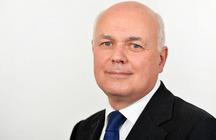Iain Duncan Smith – 2021 Speech on HRH The Duke of Edinburgh
The speech made by Iain Duncan Smith, the Conservative MP for Chingford and Wood Green, in the House of Commons on 12 April 2021.
I rise to extend my condolences to Her Majesty the Queen on the death of her liegeman of life and limb, who was her husband, a father, grandfather and great-grandfather, and a remarkable man.
He was talented in his own right, as we have heard and read so much in the last few days, at many things that I suspect many of us had no idea he did. I try to paint, and I understand what it is to be described as adequate, but I have to tell anyone who does not paint yet that they have something to discover—that even getting the right colours in the right place at the right time is, as far I am concerned, brilliant. We have discovered that he had all these elements and talents, and did so many things, and was not just innovative, designing his own machinery, but just had that intelligence, drive and leadership. From the armed forces, through hundreds of charities and so many thousands of public events, the Duke of Edinburgh added much distinction throughout. He brought distinction to all that he did, even if it was telling business leaders to pull their fingers out, saying it was quite clear the UK needed business leaders who actually led and actually produced something people wanted to buy. He was quick to spot that was missing—it was not about the people working in the businesses, but about the people not leading them properly—and that was considered quite outrageous.
The thing that has struck me has been the huge fondness—the outpourings of fondness––that have come in the last few days. I did not expect quite that level of fondness, because I thought by now many of the new generations would not recognise or even understand some of the things the Duke of Edinburgh had done, but their fondness and their sense of who he was is quite interesting.
I would like to reflect on the fact that in a way there is something else the Duke of Edinburgh represents: he represents the passing, finally, of the greatest generation. That generation was prepared to sacrifice everything—everything—so that the rest of us could live in peace and prosperity. They did not ask any questions and what defined them so much, and I think defined him in a way, was this sense of duty and an obliging sense of service no matter what the request or command. They were uncomplaining or, as the Duke of Edinburgh would say, they never bellyached. They were always understated and never complained. With those of my father’s generation, we could hardly ever hear them say a word about what they went through; they just shrugged. They never complained about their illnesses or their war wounds, but just got on with life. He was very much a representative of that remarkable—remarkable—generation, as is of course Her Majesty the Queen.
The one area I wanted to remark on is that that generation had this incredible sense of humour in the most difficult and appalling times. I hope my right hon. Friend the Secretary of State for Health does not mind if I relate one particular story so typical of His Royal Highness. We were in the receiving line for civil service awards, and I was standing but one or two away from my right hon. Friend when the Duke of Edinburgh arrived. Her Majesty the Queen went through very calmly and quietly: she shook everyone’s hand, said a few words to them and moved on. He came through just behind her, and as he was getting to my right hon. Friend asking people what they did, he asked him, “What do you do?” He boldly announced—this was some years ago—that he had just been put in charge of nuclear submarines. “But,” he said, smiling, “I don’t know anything at all about them, Your Royal Highness”, whereupon he guffawed immediately and said, “How typical! Typical of politicians—in charge of something, and not a single clue about it.” He roared with laughter and walked on, with everybody else in complete and utter silence. He asked me what I did, and I said, “Sir, nothing that important”, which had the merit of being true, and he moved on.
I have to say that the Duke of Edinburgh was straight and very funny, and that is a key element of this. In this generation, I wonder what he thought about social media, where everybody complains or bellyaches the whole time about everything and about each other, often rudely and arrogantly—something that he and that generation would I think have considered appalling. “If you have nothing good to say about someone,” the old rule was, “then don’t say it.” Of course, this will fly over our heads here, I suspect, quite happily.
I end by simply saying that the one thing we must all remember is that here was a man with a glittering potential career who chose, because of love, to walk a pace behind the woman he loved and to serve her, and by serving her he served his country with distinction. Nothing else needed to be said. His departure is a loss for us all, but in relation to the fact that we have such a great monarch, the reality is that it is because we had a great man beside her, and for that I give thanks.


